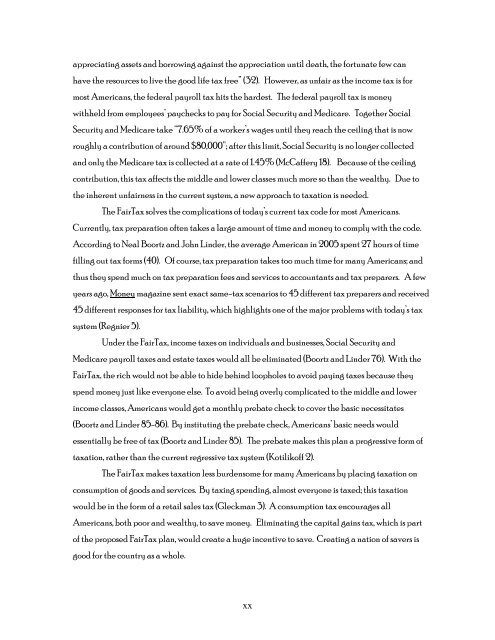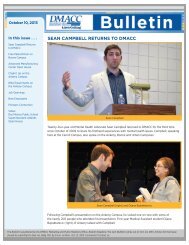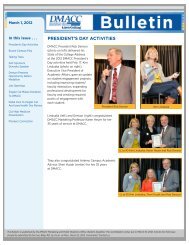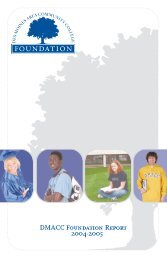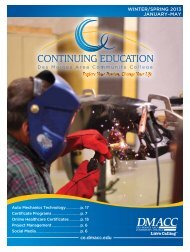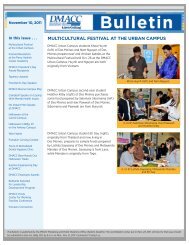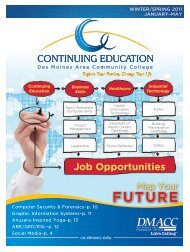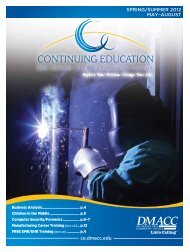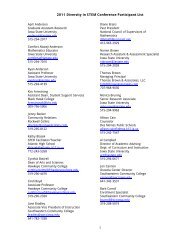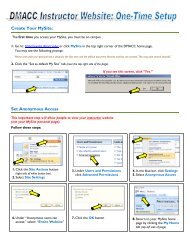The Skunk River Review - DMACC
The Skunk River Review - DMACC
The Skunk River Review - DMACC
You also want an ePaper? Increase the reach of your titles
YUMPU automatically turns print PDFs into web optimized ePapers that Google loves.
appreciating assets and borrowing against the appreciation until death, the fortunate few can<br />
have the resources to live the good life tax free” (32). However, as unfair as the income tax is for<br />
most Americans, the federal payroll tax hits the hardest. <strong>The</strong> federal payroll tax is money<br />
withheld from employees’ paychecks to pay for Social Security and Medicare. Together Social<br />
Security and Medicare take “7.65% of a worker’s wages until they reach the ceiling that is now<br />
roughly a contribution of around $80,000”; after this limit, Social Security is no longer collected<br />
and only the Medicare tax is collected at a rate of 1.45% (McCaffery 18). Because of the ceiling<br />
contribution, this tax affects the middle and lower classes much more so than the wealthy. Due to<br />
the inherent unfairness in the current system, a new approach to taxation is needed.<br />
<strong>The</strong> FairTax solves the complications of today’s current tax code for most Americans.<br />
Currently, tax preparation often takes a large amount of time and money to comply with the code.<br />
According to Neal Boortz and John Linder, the average American in 2005 spent 27 hours of time<br />
filling out tax forms (40). Of course, tax preparation takes too much time for many Americans; and<br />
thus they spend much on tax preparation fees and services to accountants and tax preparers. A few<br />
years ago, Money magazine sent exact same-tax scenarios to 45 different tax preparers and received<br />
45 different responses for tax liability, which highlights one of the major problems with today’s tax<br />
system (Regnier 5).<br />
Under the FairTax, income taxes on individuals and businesses, Social Security and<br />
Medicare payroll taxes and estate taxes would all be eliminated (Boortz and Linder 76). With the<br />
FairTax, the rich would not be able to hide behind loopholes to avoid paying taxes because they<br />
spend money just like everyone else. To avoid being overly complicated to the middle and lower<br />
income classes, Americans would get a monthly prebate check to cover the basic necessitates<br />
(Boortz and Linder 85-86). By instituting the prebate check, Americans’ basic needs would<br />
essentially be free of tax (Boortz and Linder 85). <strong>The</strong> prebate makes this plan a progressive form of<br />
taxation, rather than the current regressive tax system (Kotilikoff 2).<br />
<strong>The</strong> FairTax makes taxation less burdensome for many Americans by placing taxation on<br />
consumption of goods and services. By taxing spending, almost everyone is taxed; this taxation<br />
would be in the form of a retail sales tax (Gleckman 3). A consumption tax encourages all<br />
Americans, both poor and wealthy, to save money. Eliminating the capital gains tax, which is part<br />
of the proposed FairTax plan, would create a huge incentive to save. Creating a nation of savers is<br />
good for the country as a whole.<br />
xx


